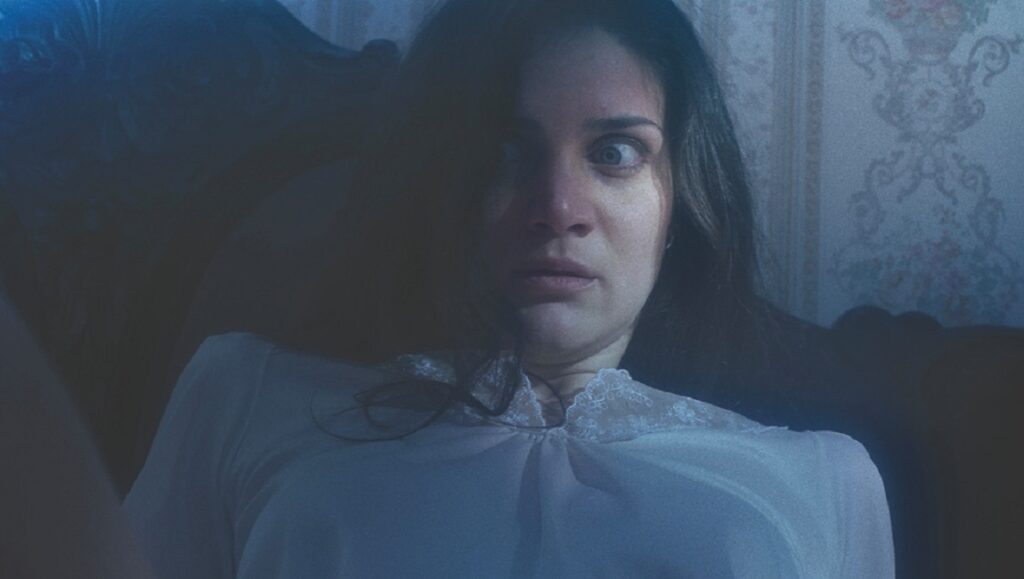1982’s supernatural horror flick The Entity — based on a true story, mind you — concerned a woman who was repeatedly assaulted and raped by an unseen force. The new Uruguayan film Ghosting Gloria dares to ask the question: what if that same premise was turned into a romantic comedy? Shockingly, the end results aren’t nearly as offensive as that brief description might imply, as filmmaking duo Marcela Matta and Mauro Sarser show a deft hand in handling material that could easily spin out of control. Their touch is light, even as their tale tackles female sexuality in a way that is neither flippant nor judgmental. The titular Gloria (Stefania Tortorella) is a thirty-year-old single woman living in Montevideo who works at a local bookstore with her blunt and perpetually horny best friend, Sandra (Nenan Pelenur). A typical sex-centric work conversation leads to the discovery that Gloria has never achieved orgasm, a fact that results in plenty of sleepless nights as Gloria is forced to endure the sounds of her upstairs neighbors humping like rabbits. Seeking a change in her life, Gloria moves into a new place, one whose previous owner unexpectedly died of a brain aneurysm, and whose spirit still haunts the premises. He is also incredibly horny, and it doesn’t take long for this ghost to perform cunnilingus on an unsuspecting Gloria, who is at first startled but goes along for the ride because he is so damn good at it, resulting in the first of many OOOs.
Given the incredible ickiness of that setup, which immediately raises issues of assault and consent, it seems necessary to qualify what’s going on here: Matta and Sarser establish a tone of explicitly playful horniness prior to these events, reminiscent of nothing more than the early works of Pedro Almodovar, and the initial encounter here is portrayed in such an absurdist way that any hints of impropriety practically vanish as Gloria implores her spectre to continue his carnal activities, beating the wall and screaming in orgasmic, over-the-top ecstacy. What follows is a love story between Gloria and her ghost, the perfect partner because, as she states, “I can talk about myself for hours and he never complains or interrupts.” And while all this alone would be enough plot for several films, Ghosting Gloria simply cannot stop, instead opting for an approach that demands to be described as epic. The film is ultimately a tale of one woman finding happiness on her own terms, putting aside societal expectations and choosing to live each day to its fullest, and it’s a journey that involves a suicide attempt, a trip to Heaven — or some Heaven-adjacent destination — and a possible romance with her asshole boss, Gustavo (co-director and writer Sarser).
All that is to say, Ghosting Gloria is stuffed to the gills, and the experience becomes exhausting long before the end credits roll. The further the film moves away from its supernatural elements, the more pedestrian it becomes, delivering a message of female empowerment that, while always welcome, does scan as a tad trite here. And the Almodovar allusions sadly dissipate entirely by the second half, an unfortunate development that ultimately makes the film a tidier fit in Hallmark territory. Still, Ghosting Gloria is never a chore to sit through, thanks to the visual playfulness of co-directors Matta and Sarser — just wait until you get a load of Heaven, which looks a little like a toilet paper commercial, in the best possible way — as well as a game lead performance from Tortorella, who imbues Gloria with equal parts strength, femininity, and vulnerability. The actress has presence to burn, and if this film doesn’t fully match her quality, her career should still fairly blow up if enough viewers catch this flick. That certainly seems possible, as LionsGate has already picked Ghosting Gloria for North American distribution, and it’s no real surprise; it’s a film built and bred to be a crowd-pleaser, and just in case you forgot, yes, we’re talking about a movie where a woman receives oral pleasure from a ghost. General audiences will undoubtedly be more forgiving of its flabbier tendencies and focus on its infectious spirit, which is hard to deny. But a truly fair assessment has to take note of the old adage: sometimes less is indeed more.
Published as part of Fantasia Fest 2021 — Dispatch 3.


Comments are closed.